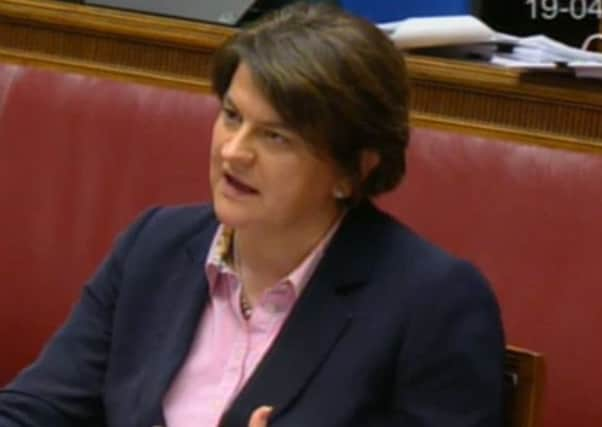Foster wanted RHI whistle-blower email published, says civil servant


Last week, Mrs Foster distanced herself from the “wrong” decision to release the email from Janette O’Hagan, telling the RHI inquiry that others in the party had been handling the issue.
But evidence published by the inquiry reveals a claim by one of Stomont’s most senior civil servants that it was the first minister who wanted the email released.
Advertisement
Hide AdAdvertisement
Hide AdIt seems from the evidence published by the inquiry that Mrs Foster’s involvement was at the start of the process and that subsequently the DUP was firmly led to believe that the whistle-blower had agreed to publication of the email, which was not in itself a whistle-blowing email but was followed by explicit warnings in other correspondence about RHI abuse.
Appearing before the inquiry last week, the DUP leader was asked whether her party had done enough to protect Ms O’Hagan’s identity before publishing an email which she had sent to Mrs Foster’s department in 2013. Referring to others in her party, Mrs Foster said that “they” had “asked the department around this email. The answers they got back were, they felt, enough to allow them to put out the statement, and it turns out that’s not the case, and, of course, I regret that that’s the case”.
Ms O’Hagan has always been adamant that she never gave permission for her email to be released but Mrs Foster said the DUP had an “understanding” that she was happy for it to be published.
Given that contradictory evidence, inquiry chairman Sir Patrick Coghlin said: “We really need to know how that [DUP] understanding came to be formed.”
Advertisement
Hide AdAdvertisement
Hide AdMrs Foster replied: “Well, I’m sorry I can’t help you with that, chair, because I wasn’t in the middle of this discussion. I was elsewhere at the time, trying to deal with other issues.”
Sir Patrick then said: “Because there are several different possibilities, one of which was she was fed to the wolves.”
Referring to a robust press release from DUP deputy leader Nigel Dodds which had been issued when the email was released, Mrs Foster also said: “People had made allegations. The deputy leader was trying to deal with those allegations – wrongly, as it turned out – and that’s where we have ended up.”
However, a written witness statement to the inquiry from Andrew McCormick – who was the most senior civil servant in Mrs Foster’s former department, the Department for the Economy, at that time – sheds new light on the DUP leader’s role in the process.
Advertisement
Hide AdAdvertisement
Hide AdIn the statement, Dr McCormick said: “Following discussion in Stormont Castle with the first minister, minister Hamilton and the Spads, the first minister wanted to release the email publicly.
“However, it was recognised that it was important to be sure that there had been no other communication from Janette O’Hagan, and that she would not object to it being published.”
Dr McCormick then asked officials in his department to contact Ms O’Hagan to establish if the email was the only time she had contacted Mrs Foster and whether she objected to its release.
Somehow, what she says was her opposition to the email being published was not, it seems, conveyed to the DUP.
Advertisement
Hide AdAdvertisement
Hide AdThe information in Dr McCormick’s witness statement shows that the DUP released Ms O’Hagan’s email just 19 minutes after the senior civil servant had emailed the first minister’s office to relay what he said he believed was Ms O’Hagan’s agreement for the email to be released.
Dr McCormick said that there was a “febrile” situation in which there was a “pervading atmosphere of pressure from political level”, with “pressure” from the DUP to defend Mrs Foster against what he described as “a tide of media attacks” He said: “At the time, we believed these points were a true and fair reflection of Janette O’Hagan’s position, but it is clear that we acted hastily in not waiting for her to check her computer records and come back to us.”